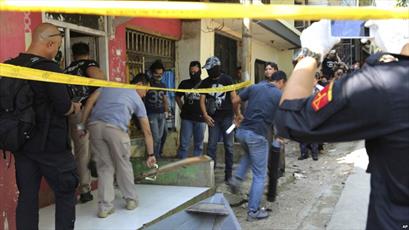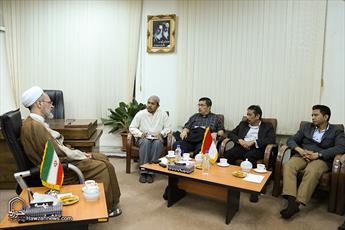Hawzah News Agency - Using the pretext of an offhand remark the governor made about the Koran, masses of enraged Muslims took to the streets to denounce him. In short order he lost the election, was
arrested,
charged with blasphemy, and sentenced to two years in prison.
This episode is especially alarming because Indonesia, the world’s largest Muslim country, has long been one of its most tolerant. Indonesian Islam, like most belief systems on that vast archipelago, is syncretic,
gentle, and open-minded. The stunning fall of Jakarta’s governor reflects the opposite: intolerance, sectarian hatred, and contempt for democracy. Fundamentalism is surging in Indonesia. This did not happen
naturally.
Saudi Arabia has been working for decades to pull Indonesia away from moderate Islam and toward the austere Wahhabi form that is state religion in Saudi Arabia. The Saudis’ campaign has been patient, multi-
faceted, and lavishly financed. It mirrors others they have waged in Muslim countries across Asia and Africa.
Successive American presidents have assured us that Saudi Arabia is our friend and wishes us well. Yet we know that Osama bin Laden and most of his 9/11 hijackers were Saudis, and that, as Secretary of State
Hillary Clinton wrote in a diplomatic cable eight years ago, “Donors in Saudi Arabia constitute the most significant source of funding to Sunni terrorist groups worldwide.”
Recent events in Indonesia shine a light on a Saudi project that is even more pernicious than financing terrorists. Saudi Arabia has used its wealth, much of which comes from the United States, to turn entire
nations into hotbeds of radical Islam. By refusing to protest or even officially acknowledge this far-reaching project, we finance our own assassins — and global terror.
The center of Saudi Arabia’s campaign to convert Indonesians to Wahhabi Islam is a tuition-free university in Jakarta known by the acronym LIPIA. All instruction is in Arabic, given mainly by preachers from
Saudi Arabia and nearby countries. Genders are kept apart; strict dress codes are enforced; and music, television, and “loud laughter” are forbidden. Students learn an ultra-conservative form of Islam that favors
hand amputation for thieves, stoning for adulterers, and death for gays and blasphemers.
Many of the students come from the more than 100 boarding schools Saudi Arabia supports in Indonesia, or have attended one of the 150 mosques that Saudis have built there. The most promising are given
scholarships to study in Saudi Arabia, from which they return fully prepared to wreak social, political, and religious havoc in their homeland. Some promote terror groups like Hamas Indonesia and the Islamic
Defenders Front, which did not exist before the Saudis arrived.
Eager to press his advantage, King Salman of Saudi Arabia made a nine-day trip to Indonesia in March, accompanied by an entourage of 1,500. The Saudis agreed to allow more than 200,000 Indonesians to
make the hajj pilgrimage to Mecca each year — more than come from any other country — and sought permission to open new branches of their LIPIA university. Some Indonesians are pushing back against the
Saudi assault on their traditional values, but it is difficult to deny permission for new religious schools when the state is not able to provide decent secular alternatives. In Indonesia, as in other countries where
the Saudis are actively promoting Wahhabism — including Pakistan, Afghanistan, and Bosnia — the weakness and corruption of central governments create pools of rootless unemployed who are easily seduced
by the promises of free food and a place in God’s army.
The surging fundamentalism that is transforming Indonesia teaches several lessons. First is one that we should already have learned, about the nature of the Saudi government. It is an absolute monarchy
supported by one of the world’s most reactionary religious sects. It gives clerics large sums to promote their anti-Western, anti-Christian, anti-Semitic brand of religious militancy abroad. In exchange, the clerics
refrain from criticizing the Saudi monarchy or its thousands of high-living princes. Saudis with close ties to the ruling family give crucial support to groups like Al Qaeda, the Taliban, and ISIS. This fact should
be at the front of our minds whenever we consider our policy toward the Middle East — including when we decide whether to side with the Saudis in their new dispute with neighboring Qatar.
Saudi Arabia’s success in reshaping Indonesia shows the importance of the global battle over ideas. Many in Washington consider spending for cultural and other “soft power” projects to be wasteful. The Saudis
feel differently. They pour money and resources into promoting their world view. We should do the same.
The third lesson that today’s Indonesia teaches is about the vulnerability of democracy. In 1998 Indonesia’s repressive military dictatorship gave way to a new system, based on free elections, that promised civil
and political rights for all. Radical preachers who would previously have been imprisoned for whipping up religious hatred found themselves free spread their poison. Democracy enables them to forge giant
mobs that demand death for apostates. Their political parties campaign in democratic elections for the right to come to power and crush democracy. This is a sobering reality for those who believe that one
political system is best for all countries under all circumstances.
The Saudi campaign to radicalize global Islam also shows that earth-shaking events often happen slowly and quietly. The press, focused intently on reporting today’s news, often misses deeper and more
important stories. Historians of journalism sometimes point to the northward “great migration” of African-Americans after World War II as an epochal story that few journalists noticed because it was a slow
process rather than one-day news event.
The same is true of Saudi Arabia’s long campaign to pull the world’s 1.8 billion Muslims back to the 7th century. We barely notice it, but every day, from Mumbai to Manchester, we feel its effects.




Your Comment